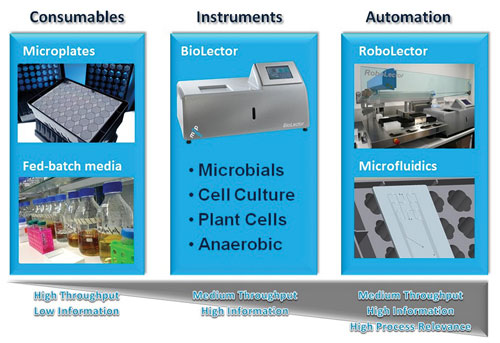October 1, 2011 (Vol. 31, No. 17)
Smart Microbioreactors to Speed Up Bioprocess Development
m2p-labs spun off of the RWTH Aachen University (Germany) in 2005. Since then the company has developed into one of the leading technology suppliers for the life science industry. Based in Baesweiler near Aachen, m2p-labs has focused on the development of intelligent new tools at microscale to fulfill the needs in bioprocess development.
The combination of high-throughput experimentation, online monitoring, scalability, and automation has made m2p-labs’ technology into one of the preferred solutions in modern biotechnology labs. Our mission is to bring bioprocesses as fast as possible from microreactor to process (m2p).
The company currently has 12 employees, consisting of well-trained engineers, biotechnologists, service technicians, accountants, and sales managers. Due to the close relationship with RWTH Aachen University, m2p-labs is backed-up by scientists and engineers of this well-known university and conducts several joint research projects in the field of microreaction engineering with the university as well.

Markets Served
m2p-labs serves the life science instrumentation market with intelligent and efficient bioprocessing tools. The company’s microbioreactors are applied in screening, media optimization, fermentation optimization as well as in toxicity studies. Generally, the characterization of cell growth and protein expression is necessary in almost any biotechnology laboratory. Therefore, customers can be found in basic research institutes, universities, as well as in screening and development departments of industrial companies.
The company’s major contribution is made to the biotech, chemical, and biopharmaceutical industry. Here, high-throughput experimentation ensures these industries keep on track in projects and importantly enables them to reach their goals in respect to time-to-market. Recently, the company expanded its technology to address anaerobic and phototrophic fermentations. This opens the market to an even broader application range in industrial biotechnology.

Capabilities
New bioprocesses are continuously evolving and bioprocessors are searching for the easiest way to process samples in R&D. There is currently a huge trend toward disposable production systems. For these purposes plastic bags, stirred tank reactors, and storage tanks are established on the market. Unfortunately, these reactor types are not suitable to perform sophisticated bioprocess development. In bioprocess R&D throughputs of 50 to 1,000 fermentations are needed. Therefore, m2p-labs developed high-throughput tools and convenient solutions for a better life in biotechnology labs.
BioLector® Technology
The BioLector is a unique high-throughput fermentation system. In 48 parallel cultures the most important fermentation parameters like biomass concentration, pH, and DO as well as fluorescent proteins or substrates can all be monitored online. Most importantly, the system is very easy to handle and the disposable and precalibrated microplates can be immediately installed in the BioLector after inoculation of the medium. The incubation chamber allows for control of temperature, humidity and specific gas concentrations (O2, CO2, anaerobic, micro-aerophilic, and syngas). The device is approved for microbial, mammalian, plant, human, and anaerobic cells.
Flowerplate®
The Flowerplate was designed to provide high oxygen mass transfer (OTR > 0.150 mol/L/h). This is achieved by the patented flower shape of the wells on a standard microplate footprint. Now, microbial cells can be operated also in microscale under oxygen-unlimited culture conditions in 48 parallel microbioreactors. Good mass transfer conditions are the prerequisite for scale-up to stirred tank bioreactors, which is a must when working at microscale.
Feed in Time™–Fed-Batch Media
Fed-batch processing is the most abundant technology in bioproduction processes. Nevertheless, clone screening and bioprocess development is still conducted in batch mode due to limited technology availability in small scale. The Feed in Time fed-batch media series resolve this fundamental problem. Now, it is possible to apply also in small and microscale glucose-limited growth in fed-batch mode. m2p-labs offers synthetic and complex ready-to-use media for E. coli, Bacillus subtilis, Pichia pastoris, Hansenula polymorpha, and Saccharomyces cerevisiae. Further media are in development and can be customized on request.
RoboLector™
The RoboLector is a combination of a (pipetting-) Robot and the BioLector. That means, the BioLector can be integrated into standard liquid-handling systems such as those from Tecan, Hamilton Robotics, PerkinElmer, and Beckman Coulter. Hence, it is possible to automate upstream bioprocessing completely. The system can be used for media preparation, automated sampling, induction, and fed-batch processing. The RoboLector brings more reproducibility and reliability into any biological experiment and is ideally suited to incorporate DoE plans. The systematic use of this system provides detailed process understanding and is a very useful tool for QbD and PAT.
m2p-labs
Arnold-Sommerfeld-Ring 2
52499 Baesweiler, Germany
Phone +49-(0)2401-805330
Website www.m2p-labs.com
Date Founded 2005
Number of Employees 12



